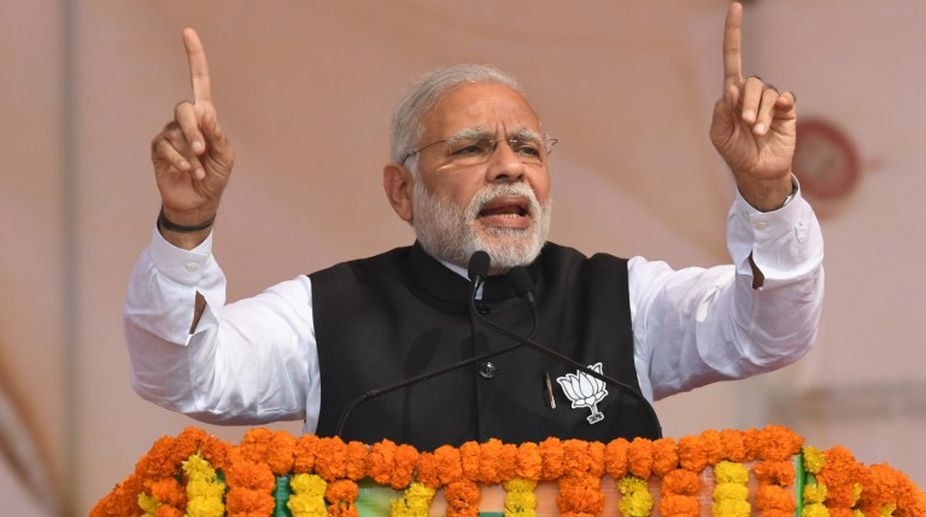Congress conspiring to kill reservation; inciting Dalits, OBCs to fight among themselves: Modi
He said that the Congress ruled India for decades, but their only intention was to keep problems alive and trap people in them.

Narendra Modi (PHOTO: AFP)
There was politics even during the period when I was in college before partition. But it was not on communal lines as it is today. Then the enemy was the British and all of us were in a struggle to oust them. It was a time when Mohammad Ali Jinnah came to the Law College at Lahore and exhorted all of us to make a joint effort to drive out the British.
Subsequently, things came to such a pass that even water was divided into Hindu pitchers and Muslim pitchers. We, the students, were not contaminated at that time. We would eat together at the same table, ordering food from the Hindu kitchen as well as from the Muslim kitchen.
Today the polarisation has contaminated the Hindu community, dividing it into castes. Prime Minister Narendra Modi did not recognise this and recently talked about kabaristan and samshan bhoomi. He unnecessarily brought in religion asking there was no power at samshan bhoomi while it was available at kabaristan.
Advertisement
Uttar Pradesh chief minister Akhilesh Yadav corrected the Prime Minister and said his state had electricity for 24 hours and both kabaristan and samshan bhoomi get constant power supply. The complaint the Muslims make is that there are fewer ATMs in their localities and they feel handicapped in withdrawing money.
This may be true. But the Muslims do not point to the real reason. They lost their importance after the creation of Pakistan which was founded on the basis of religion. Congress leader Maulana Abul Kalam Azad fought a lonely battle against this thinking during the British period itself. He would say that if the Muslims felt unsafe or insecure in a large country like India, they would feel still more unsafe in a partitioned India because the Hindus would tell Muslims to go to Pakistan after having taken their share.
This is precisely what happened. It was Jawaharlal Nehru who was able to stop the exodus. Along with Sardar Patel, who was not enthusiastic about Muslims staying back in India, he appealed to the Hindus on the basis of Mahatma Gandhi's thinking that there would be no distinction between Hindus and Muslims.
The Muslims community has lost its importance in government affairs after partition. They number about 17 crore in India but have no important portfolio in the Narendra Modi cabinet. Mukhtar Abbas Naqvi was the lone Muslim face until M.J. Akbar was inducted as the second minister of state. This does not, however, cover up the tilt towards Hindus.
The scenario in UP only underlines Modi's and the BJP’s thinking. True, Hindus are in a preponderant majority in India but the country is ruled by the Constitution which gives voting rights to every individual without any distinction. When this clause was discussed in the Constituent Assembly, Sardar Patel was willing to give reservations to Muslims. But the community refused it on the ground that such thinking would result in another division.
Nonetheless, the appeal to voters is still on the basis of caste and creed. Although the Election Commission has banned invoking the name of religion or community, political leaders continue to use them so blatantly because they know that Muslims do have a say when it came to elections.
We could see leaders of all hues and parties trying to woo the Muslim voters during the recent election campaigns in UP, without saying anything to ameliorate their conditions which is worse than that of Dalits according to the Sachar Commission report. The offer of freebies, including electricity and writing off loans to farmers are routine tricks adopted by all political parties. This once again goes on to prove how the Muslims are used as a vote bank.
Unfortunately, all this lasts until the polling dates. Soon after, different parties go their own way and the elected government once again turns a blind eye towards the betterment of Muslims. The wishes and aspirations spelled out in the Constitution become only a mirage. The Muslims are pushed into the background to be brought back to the forefront before another set of elections.
I witnessed a similar scenario when I left my hometown Sialkot. There were no differences during those days and we lived as citizens, not as Hindus and Muslims. I had even got the crescent tattooed at the bidding of my Muslims friends. However, none of them agreed to my plea that one of them should have a tattoo of OM. They said that they would be beaten up at their home if they did.
We have come a long way from that time. Today, society is so polarized that the question of tattooing another religion’s symbol does not arise. He would be a brave man who dares the community by violating its code. Muslims prefer to live in localities where their community’s people are concentrated. They do not feel safe in a mixed or secular habitation.
At the same time a Muslim does not get accommodation or think of buying a property in a non-Muslim locality. They do not even agitate lest they should be misunderstood. But there are instances of Muslims having bought properties in a Hindu locality after the court’s intervention. Of course, there are some misguided elements among Muslims throwing their weight about.
However, despite the Hindutva factor people in India are realizing that they have to live together as they have done for centuries. That is the idea of India and most people are clutching at it.
The writer is a noted journalist, columnist and commentator.
Advertisement